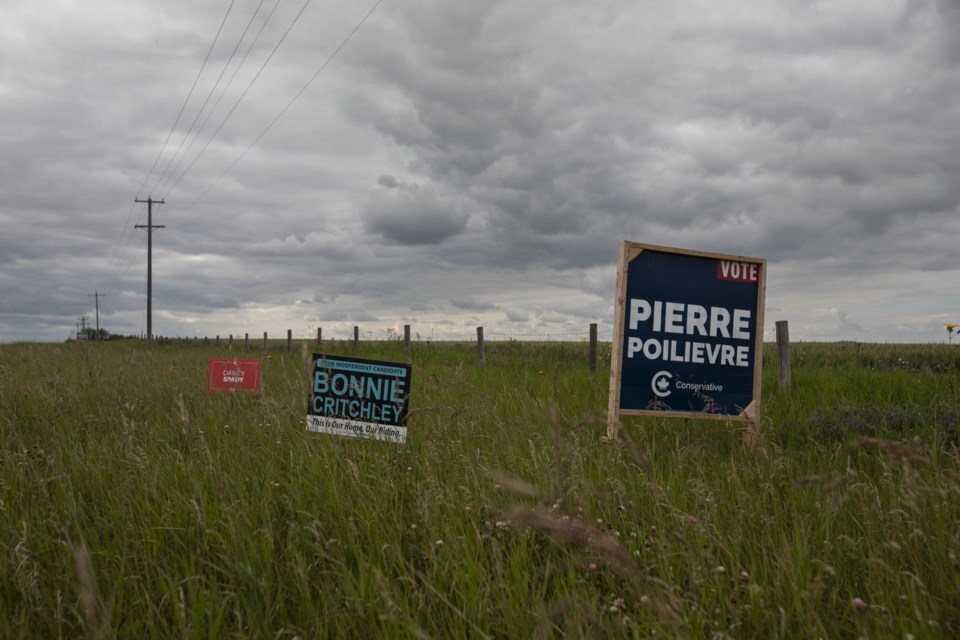CAMROSE — Pierre Poilievre was greeted with cheers and applause by the hundreds of Albertans who showed up to watch a two-and-a-half-hour political debate on a sunny Tuesday evening in July.
The Camrose and District Chamber of Commerce hosted a candidates' forum featuring 10 of the people who are vying to represent Battle River—Crowfoot in the Aug. 18 byelection.
"My mission here is to give national leadership to the issues that are of local importance," Poilievre told the sold-out crowd.
The Conservative leader is widely expected to win the sprawling eastern Alberta riding, which is considered one of the safest Tory seats in the country.
Damien Kurek won more than 82 per cent of the vote in the April election. He resigned to allow Poilievre, who lost his own seat in the Ottawa riding of Carleton, the chance to return to the House of Commons in the fall.
A crowd of Poilievre's supporters was outside the venue before things got underway, many carrying signs with his name. Inside, the signs had to be put away.
The moderator kept a tight schedule, cutting off the microphones of anyone who ran over their allotted time as the candidates answered a range of questions submitted by the public about the economy, health care privatization, electoral reform and immigration.
The candidates seated at a long table on a stage occasionally took aim at Poilievre, particularly for the fact that he does not live in the riding and is running to progress his political career.
Liberal candidate Darcy Spady introduced himself by saying, "I'm from Three Hills, and I don't want to be prime minister" — a line that elicited chuckles from the crowd and from Poilievre when he repeated it.
Spady said he wanted to bring local issues to the government caucus and give an electorate that has historically voted Conservative the option of voting in a centrist.
“I’d like to grow the culture so the next generation can say, ‘Oh, we can choose a Liberal, a Conservative, a moderate, a NDP,” he said in an interview after the debate.
“The stigma of only voting to the right here, in my home, all my life... I don’t like that.”
Poilievre argued that electing the leader of a political party is a trade-off — leaders are on the road much of the time, he said. "The other side, though, is that leader can bring a very powerful megaphone to the local issues of the community," he added.
Independent candidate Bonnie Critchley pointed out in her closing statement that several candidates, including Poilievre, won't be able to vote in the byelection because they don't live in the riding.
"I firmly believe that Mr. Poilievre is too busy with his personal ambitions to give a rat's backside about us," Critchley said in her closing statement.
She got loud cheers from the crowd earlier in the evening as she argued for local representation.
"If you want to run for an area, you need to live here. This longest ballot crap, that's got to stop," she said.
More than 200 candidates were signed up to run in the byelection as of Tuesday, most of whom were sponsored by the Longest Ballot Committee protest group.
The group says it's trying to get attention for electoral reform, arguing that Canada needs to end the first-past-the-post system.
As a result of the protest, Elections Canada has decided that voters will write in the name of their selected candidate on a modified ballot in the byelection, rather than selecting from a list of 200.
The longest ballot group signed up 85 people to run in Carleton during the April election, and ran dozens of candidates in byelections last summer.
Poilievre called the Longest Ballot Committee "a total scam that must be stopped," and pledged that if he's elected, he will put forward legislative changes to ensure it doesn't happen again.
In opening and closing statements, a number of candidates said Ottawa takes advantage of Alberta and pledged to try to end equalization. One candidate expressed sympathy for Alberta's separatist movement.
There was broad agreement from candidates that, while immigration has historically been important, Canada needs to pull back on the number of people it is letting in.
"We must have more people leaving than coming over the next several years as we bring down our population," Poilievre said.
Green Party candidate Ashley MacDonald and the NDP's Katherine Swampy called immigration one of the country's strengths.
Critchley and fellow Independent candidate Sarah Spanier made pitches to voters that they would hold a powerful position as Independent MPs in a minority government, and would leverage that to help the riding.
The forum also featured candidates from the People's Party of Canada, the Libertarian Party, the Christian Heritage Party and the United Party of Canada.
"I think we all know this is Pierre's riding to lose here; he's definitely going to win," MacDonald said in his closing statement. "So please, take a chance."
— by Fakiha Baig in Camrose, Alta., and Sarah Ritchie in Ottawa
This report by The Canadian Press was first published July 29, 2025.
The Canadian Press


